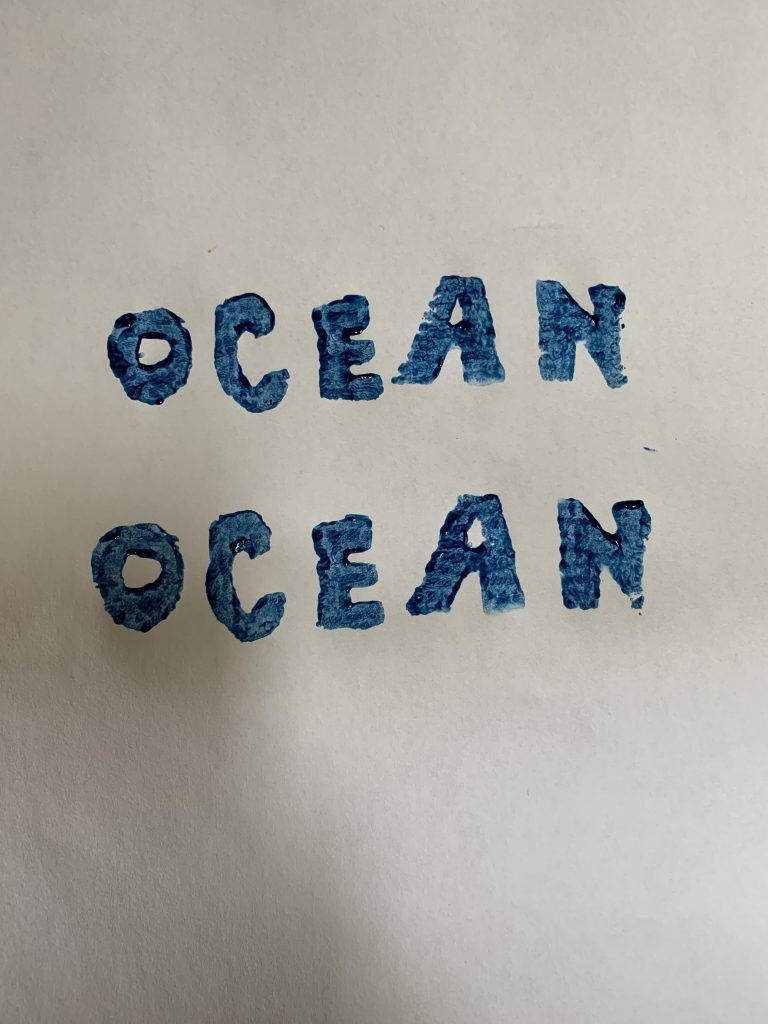Option 2 – Potato Printing
Reflection
Task 4 involved choosing a 5 letter word and making a stamp to print that word on a piece of paper. The word that I chose was the word “OCEAN” as you can see in the image of the finished product above. Before I got started I watched the short video that was provided on how to make a stamp using a potato. On initial thought, it looked fairly simple and I guessed that it would only take me a couple of minutes to make. Oh, how I was wrong. I used one potato to make two stamps and decided to carve out three letters (OCE) on one half and two letters (AN) on the other. This was fairly easy and took only about 10 minutes to complete. However, after painting the letters and then going to press the stamps on the paper, I realized that some of my letters would be backwards. I should have known. In order to print the word so that it was legible, I had to re-think how I was going to carve the letters into the potato. Luckily, I made the stamps using capital letters so for the “OCE” stamp I just flipped it and stamped it on the paper so the letter “O” came first. For the “AN” stamp I had to re-carve the letters so that letter “N” came first and letter “A” second. I also had to carve the letter “N” so that it was backwards. All of this work took me an extra 20-30 minutes to complete the task. This was actually challenging and a bit frustrating so I can only imagine how frustrating it was for early writers who had to use tools like styluses, chisels, or stamps.
On the episodes of the podcast, Stuff To Blow Your Mind, entitled “From the Vault: Invention of the Book”, Part 1 and 2, Robert Lamb and Joe McCormick discussed how early forms of text technology have adapted over time. As part of their discussion they talked about the difficulties of pre-mechanized writing, how time consuming and how much effort was required just to inscribe simple text. For example, they mention early forms of pre-mechanized books such as Mesopotamian clay tablets that were hand written cuneiform scripts that were inscribed using reeds and then baked in a fire. They also mentioned Egyptian papyrus rolls that were made of strips of the papyrus plant that were overlapped, held together with pith, and then dried. To inscribe their text they used a brush and ink (Lamb & McCormick, 2020, 28:00). These are just two examples of laborious writing techniques that must have been frustratingly time consuming similar to the potato stamp.
Looking at it from another point of view, these early writing tools were all what was known at the time so people might have thought these frustrating mistakes were just part of the writing process. Like in the video “Medieval Helpdesk in English”, what seems simple to use now, like understanding how to navigate a book, printing with stamps would have been difficult for the inexperienced. However, once they practiced and became more experienced with stamps it would have been much easier. So for myself, if I practiced more potato printing it would surely be much simpler. Looking back on this task, I think the mechanization of writing is no question one of the greatest inventions of all time. Writing a book with a printing press would definitely be easier and less frustrating than writing a book with handmade potato stamps. The mechanization of writing not only eased the pain and frustrations for people but also opened the doors to transferring knowledge quicker and to a wider audience.
References
Medieval helpdesk in English. (2008, February 23). YouTube. https://www.youtube.com/watch?v=yUQRbqc2qtY&feature=emb_imp_woyt
Lamb, R., & McCormick, J. (Hosts). (2020, May 26). From the Vault: Invention of the Book. [Audio podcast episode]. In Stuff to Blow Your Mind. iHeartRadio. https://www.iheart.com/podcast/stuff-to-blow-your-mind-21123915/episode/from-the-vault-invention-of-the-82316952/?keyid%5B0%5D=Stuff%20To%20Blow%20Your%20Mind&keyid%5B1%5D=From%20the%20Vault%3A%20Invention%20of%20the%20Book%2C%20Part%201&sc=podcast_widget
